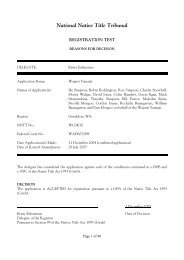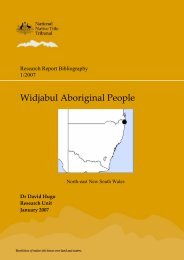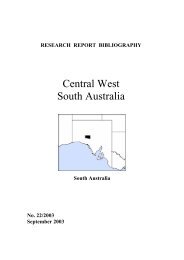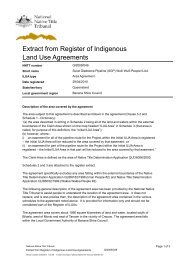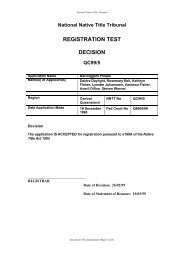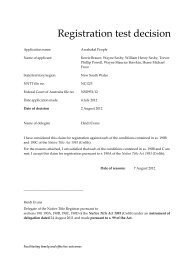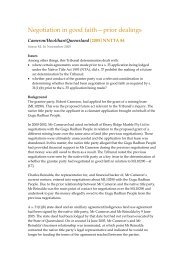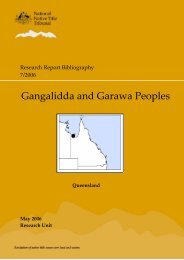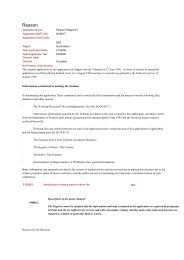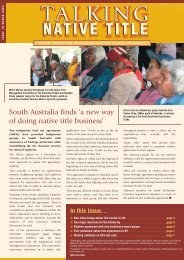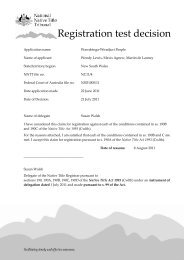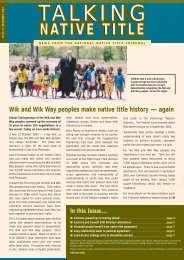Pastoral Agreements: Content Ideas - National Native Title Tribunal
Pastoral Agreements: Content Ideas - National Native Title Tribunal
Pastoral Agreements: Content Ideas - National Native Title Tribunal
Create successful ePaper yourself
Turn your PDF publications into a flip-book with our unique Google optimized e-Paper software.
<strong>National</strong> <strong>Native</strong> <strong>Title</strong> <strong>Tribunal</strong> - <strong>Pastoral</strong> <strong>Agreements</strong><br />
Part 1. Key Themes<br />
Part 2: Issues for Consideration<br />
Each agreement will turn on its own facts and other important issues may also need to<br />
be included. No attempt has been made to provide precedent clauses, as <strong>Tribunal</strong><br />
Members' experience suggests that these are of limited value. Each agreement will<br />
have its own nuances and peculiar focus that makes the use of "off the shelf" clauses<br />
potentially problematic. However, the agreements negotiated to date seem to embody<br />
the concepts of reciprocity and mutuality to a greater or lesser extent.<br />
The headings used in this guide are common to a number of actual agreements. The<br />
elements are included in dot point form under each heading and form the triggers for<br />
further inquiry. In addition some headings and elements that were not found in the<br />
pastoral agreements sampled have been included. These are italicised for ease of<br />
identification.<br />
Within the text the parties are phrased in the singular but it is recognised that there<br />
could be more than one native title party or non-native title party to an agreement.<br />
Indigenous Land Use <strong>Agreements</strong><br />
An ILUA is a statutory agreement about the use and management of land that can be<br />
made between a native title party and other interested parties such as State<br />
governments. ILUAs allow people to negotiate flexible, pragmatic agreements to suit<br />
their particular circumstances. While ILUAs can be made separately from the formal<br />
native title process, they may also be stepping stones towards, or be part of, native<br />
title determinations. A decision whether to use an ILUA needs to be made on a case<br />
by case basis and readers should refer to other <strong>Tribunal</strong> guides to assist them in this<br />
decision (see http://www.nntt.gov.au/ilua/Info.html).<br />
ILUAs may be made about matters such as:<br />
• native title holders agreeing to a future developments;<br />
• the relationship between native title rights and the rights of other people;<br />
• access and/or management arrangements;<br />
• surrender of native title; and<br />
• compensation.<br />
Unlike other agreements, once it is registered on the Register for Indigenous Land<br />
Use <strong>Agreements</strong>, an ILUA binds all native title holders to the terms of the agreement<br />
even if they are not a party to the agreement.<br />
Only ILUAs that comply with the legal requirements can be registered. By contacting<br />
the <strong>Tribunal</strong> early in the negotiation process, you will receive the assistance and<br />
information you need to ensure that the ILUA you are negotiating meets the<br />
requirements for registration (see ‘Getting help from the <strong>Tribunal</strong>’ at<br />
http://www.nntt.gov.au/ilua/Info.html).<br />
The kind of help the <strong>Tribunal</strong> may give to parties includes:<br />
• negotiation assistance;<br />
• project management;<br />
• technical information and support relating to ILUAs;<br />
9



